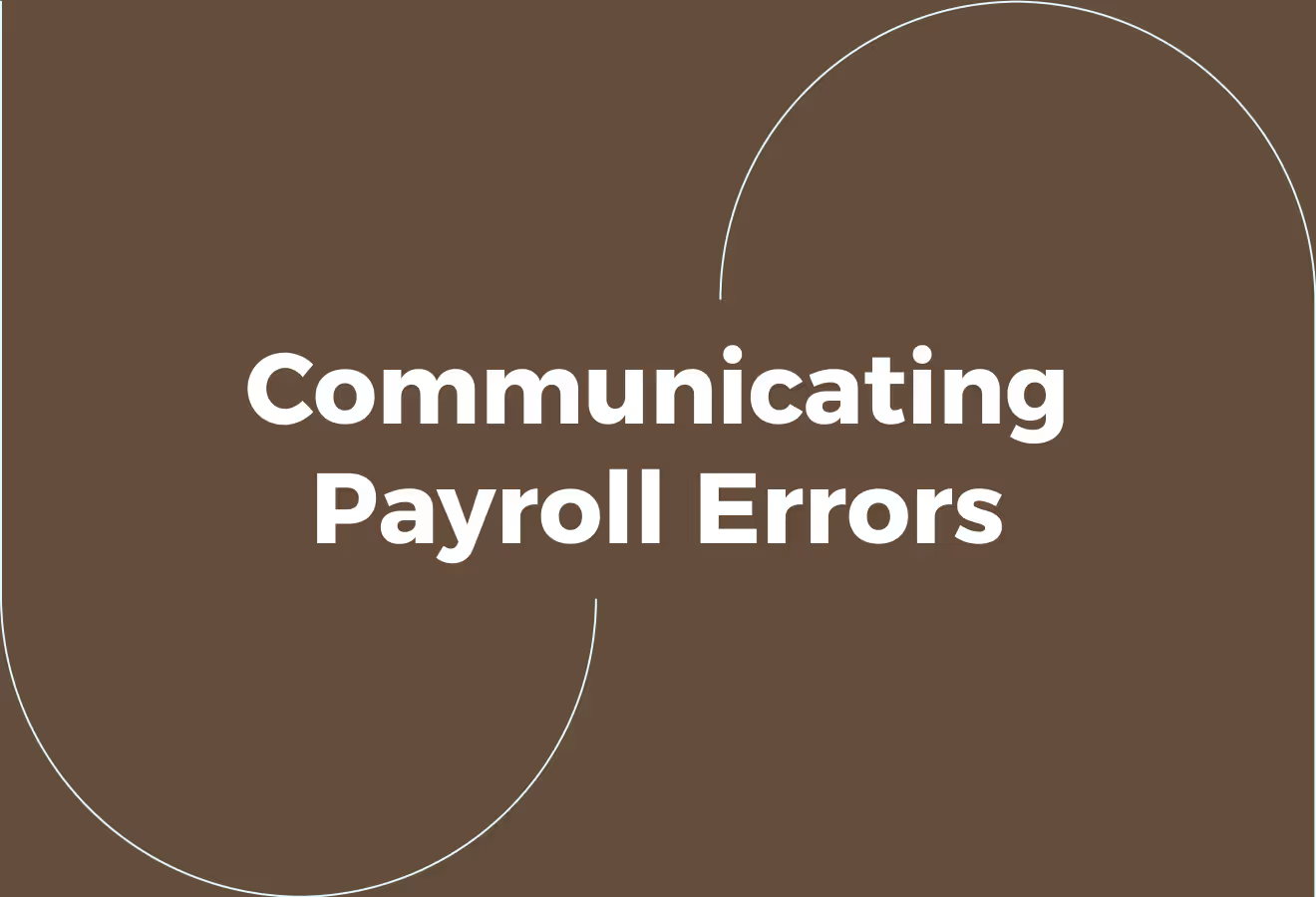The Real Cost: Consequences Of Payroll Errors & How To Avoid Them
.avif)
The Real Cost: Consequences Of Payroll Errors & How To Avoid Them
Payroll is often treated as a secondary concern in international business operations, but even minor mistakes can have lasting consequences. An overpayment might seem harmless at first until the employee is asked to return the funds. This can lead to frustration, erode trust, and damage morale. Payroll involves dozens of moving parts, and any error,whether it's in classification, deductions, or timing, can impact employee satisfaction, business efficiency, and legal compliance.
Companies relying on global solutions to manage international payroll face increased risks. Errors can result in compliance violations, penalties, or even legal exposure. To simplify global payroll management and maintain smooth operations, our global HR system helps businesses stay compliant and keep employees satisfied.
Common Payroll Errors Leading to Consequences

Managing payroll across multiple regions is no small task, and even minor errors can create serious consequences. From compliance penalties to employee dissatisfaction, the risks of payroll mistakes are real and often underestimated.
Globally, businesses achieve only a 78% payroll accuracy rate. This highlights the frequency of errors and the need for improved systems and oversight.
The following points summarise the most common payroll errors businesses face and why they matter:
- Inaccurate tax calculations that lead to fines or penalties
- Misclassification of employees, such as treating contractors as full-time staff
- Failure to comply with local labor laws and regulations
- Delayed or incorrect payments that reduce employee trust
- Insufficient record-keeping that complicates audits and compliance checks
According to the UAE Labour Law Guide for 2025, staying updated on legal requirements is essential to avoiding these common pitfalls.
Employee Classification Errors
One of the most common payroll errors is misclassifying workers. This includes incorrectly treating employees as independent contractors or vice versa. It also extends to the incorrect classification of exempt versus non-exempt staff, particularly where overtime is concerned.
These mistakes are not always intentional, especially in complex, hybrid, or remote workforce models, but they can still result in significant legal and tax liabilities. Misclassification often means unpaid benefits, underpaid taxes, or missed overtime payments, each of which can trigger audits, fines, or disputes.
To reduce risk, many leaders consult resources like Hiring in MENA: Direct Employees or Remote Contractors?.
Incorrect Tax Calculations
Tax errors remain a leading cause of payroll-related penalties. These include miscalculating income tax, social contributions, or end-of-service benefits where applicable.
The issue typically stems from outdated systems or an over-reliance on manual processes. In regions where tax legislation can change regularly, such as across the Middle East and North Africa, even a small oversight can lead to underpayments or overpayments.
These mistakes don’t just carry financial risk. They also increase the administrative load of correcting filings, handling employee queries, and responding to potential audits.
Using tools like the Gratuity Calculator Saudi Arabia can help businesses avoid common missteps in tax-related payouts.
Missed Payroll or Tax Deadlines
Delays in payroll processing or tax filings can erode employee trust and attract penalties from local authorities. This may result from human error, lack of calendar oversight, or failures in coordination across multiple markets.
Late salary payments impact employee morale and may breach local employment laws. Missed tax deadlines can trigger interest charges and reputational damage.
Timely, scheduled processing is essential, especially when managing cross-border teams and payments in different currencies. For example, Payroll Management in a Few Simple Steps outlines how automation can improve timeliness and reduce errors.
Inaccurate or Incomplete Record-Keeping
Accurate payroll records are not only required by law in many jurisdictions, they are also crucial for internal audits, year-end reporting, and resolving disputes. Yet many companies fail to keep up-to-date, detailed payroll records for each employee. Poor documentation can complicate matters during compliance checks or financial audits. It can also delay key processes like offboarding, end-of-service calculations, or statutory reporting. Leveraging platforms like Manage HR Documents & Get Compliance Alerts ensures better documentation and fewer oversights.
Payroll errors can seriously damage employee retention. If employees can’t rely on being paid accurately or on time, they won’t stay. Payroll is more than just a transaction—it’s a matter of trust. Regular issues with pay can affect staff morale, financial stability, and overall job satisfaction. Pay remains the number one reason people leave their jobs. In fact, 63% of employees who changed employers in the past year said they did so for better pay and growth opportunities. If your business gains a reputation for inconsistent pay, it becomes even harder to attract and retain talent in a competitive job market. Solutions like Custom Compensation Management can help you manage pay accurately and fairly across regions.
Related Reading
- Employer of Record Payrolling
- Employer of Record vs Staffing Agency
- Challenges of Managing a Global Workforce
Consequences of Payroll Errors for Your Business

Payroll errors can also create serious tax issues. Inaccurate tax reporting or late remittances often result in fines, interest charges, or back payments. These penalties can damage your cash flow and limit your ability to plan ahead.
Take Canada as an example, the penalty for late payroll tax remittances can be anywhere between 3% and 10%, depending on how long the payment is overdue. For small or medium-sized businesses, those costs can accumulate quickly and affect day-to-day operations.
Cercli's Global Payroll Compliance guide explains how to stay ahead of changing tax laws across markets.
Problems with Staff Retention
Errors that go uncorrected may open your business up to legal claims. Employees who aren’t paid correctly have the right to take legal action. Depending on the jurisdiction, failure to pay wages properly could be considered a breach of employment law or even fraud.
Failing to file correct tax returns or knowingly submitting inaccurate information also carries legal consequences. In some cases, this could include fines or even prosecution.
Most small businesses are not equipped to handle this level of legal and reputational damage. Using Trusted Employer of Record UAE Services can help ensure legal compliance and reduce exposure.
Tax Trouble
Even minor payroll errors require significant time and attention to resolve. HR or finance teams must investigate the issue, communicate with affected employees, and make the necessary record adjustments. This creates an administrative burden that accumulates quickly.
Research shows that the cost of just one incorrect time punch is AED 340,589 per 1,000 employees annually. In addition, correcting the mistake could demand nearly 440 hours of work, adding an extra AED 33,070 in labour costs.
That’s time teams could spend on higher-value work. Payroll isn’t just about numbers—it also involves people, compliance, and the long-term health of the business.
Managing payroll across multiple countries, especially in the UAE, Saudi Arabia, or the broader MENA region, introduces even more complexity. Choosing the right systems and support is critical to prevent the escalating costs of payroll mistakes.
Tools like Smarter Global Contractor Management can help reduce the administrative burden.
Legal Risks
Errors that go uncorrected may open a business up to legal claims. Employees who aren’t paid correctly have the right to take legal action.
Depending on the jurisdiction, failure to pay wages properly could be considered a breach of employment law or even fraud. Failing to file correct tax returns or knowingly submitting inaccurate information also carries legal consequences.
In some cases, this could include fines or even prosecution. Most small businesses are not equipped to handle this level of legal and reputational damage.
Time and Labour Costs
Even minor payroll errors require time-consuming fixes. HR or finance teams must investigate the issue, communicate with affected employees, and make adjustments to records. This ongoing administrative burden can quickly accumulate.
This is time that could otherwise be spent on higher-value work. Payroll is more than just numbers, it involves people, compliance, and the long-term health of the business.
Managing payroll becomes even more complex when operating across multiple countries, such as the UAE, Saudi Arabia, or the wider MENA region. Selecting the right systems and support is critical to avoiding the compounding costs of payroll errors.
Cercli Payroll and HR Management
Cercli is designed for companies in the Middle East who need a flexible, compliant, and reliable way to manage their workforce, whether teams are local, remote, or spread across multiple countries.
Built for the realities of doing business in the region, Cercli helps companies in the UAE, Saudi Arabia, and across MENA simplify HR operations, stay fully compliant with local regulations, and run payroll with confidence.
Cercli gives HR teams a centralised system to manage every part of the employee lifecycle: onboarding, asset management, leave tracking, time off calendars, payroll processing, and offboarding.
With one source of truth for all employee data, companies can eliminate manual processes, reduce payroll errors, and ensure full visibility across the entire organisation.
Related Reading
- Payroll Outsourcing Costs
- Payroll Internal Controls Best Practices
- Payroll and Compliance Challenges
How to Prevent Payroll Errors and Their Consequences

Many payroll errors occur when payroll administrators lack accurate or sufficient information about payroll compliance. Laws and policies frequently change and can vary widely by state, so it's essential for payroll teams to stay informed about the latest regulations in their jurisdiction, particularly for organisations with a national or global footprint.
Basic research and a healthy dose of skepticism can help prevent costly mistakes. It's helpful to revisit important concepts and confirm assumptions rather than treating them as facts.
- What’s the difference between exempt and non-exempt?
- Is this employee correctly classified?
- What are the applicable state regulations for this employee?
- How will compliance be audited when new regulations are introduced?
Run Reports Prior to Processing Payroll
Using payroll software to run key reports before processing payroll can help catch and prevent costly mistakes.
Key reports to review include:
Deductions Summary
This report provides a summary of all deductions for each employee. It allows for easy double-checking of deduction amounts to ensure accuracy.
Payroll Register
The Payroll register displays all payroll information in a consolidated, summary format. This helps in verifying employee pay, hours worked, and other payroll elements.
Cash Requirement Report
This report outlines the total amount of cash your organisation needs on hand to run payroll. It breaks down the total by key categories such as wages, taxes, and deductions, ensuring financial readiness before payroll processing.
Keep a Payroll Process Checklist
A tried-and-true checklist can be an invaluable tool in managing payroll. Payroll administrators are responsible for tracking numerous details, even when supported by software. A checklist allows them to follow each step of the payroll process methodically, reviewing each task to ensure accuracy.
Maintaining lists of all new hires, pay changes, deduction updates, and other modifications in a centralised location—organised by pay period—can streamline review. When processing payroll for a specific period, these records can be referenced to verify every update has been accurately captured.
Communicating Payroll Errors to Your Employees

Maintain Payroll Compliance
Many payroll errors stem from payroll administrators lacking sufficient or accurate information regarding payroll compliance. Laws and policies frequently change, and they can differ across states. It is crucial for payroll teams to stay informed about current regulations relevant to where the organisation operates, especially for businesses with national or global reach.
Basic research and verifying assumptions can significantly reduce the risk of payroll mistakes. For example, teams should be able to answer questions such as: What is the difference between exempt and non-exempt? Is the employee properly classified? What are the applicable state regulations for this employee? How will compliance be audited when regulations change?
The HR Policies in UAE: 2025 Compliance Cheat Sheet offers helpful guidance for navigating these challenges.
Run Reports Prior to Processing Payroll
If payroll software is available, running key reports before processing payroll can help identify and prevent mistakes. These reports offer insights to ensure all check amounts are accurate.
Recommended reports include:
- Deductions summary: provides a summary of all deductions for each employee to verify amounts.
- Payroll register: displays payroll information in a summarised format.
- Cash requirement: outlines the total funds needed to pay payroll, broken down by categories such as wages, taxes, and deductions.
Keep a Payroll Process Checklist
A tried-and-true checklist is an essential tool. Payroll administrators manage numerous tasks, even with the support of software tools. With a checklist, they can go through every step of the payroll process, reviewing each piece and ensuring everything is accurate.
Maintaining lists of all new hires, pay changes, deduction changes, and other updates in a centralised location—organised by pay period—can improve accuracy. When processing payroll for that period, administrators can review each list to confirm all changes have been correctly entered into the system.
Be Transparent About Payroll Errors
Offer a straightforward, truthful explanation of the error, but avoid assigning blame to any individual or department. Use inclusive language and take full responsibility for what happened as a leader.
Offer a sincere apology for any inconvenience caused, and reassure affected employees that steps are being implemented to prevent similar errors in the future.
Encourage employees to ask questions and provide feedback. This can uncover areas for improvement in payroll processes and foster greater trust.
Apologise Sincerely to Your Employees
This should go without saying, but be sincere in your apology. Payroll errors are not just simple miscalculations on the back end; they could be the difference between an employee making a mortgage payment or not.
The priority should, of course, be rectifying the error and making the employee financially whole. But how the mistake is communicated and handled can have a long-lasting impact on employee happiness and engagement with the company.
If addressed constructively, it can even potentially turn a negative situation into a positive.
Book a Demo to Speak with Our Team about Our Global HR System
Expanding your workforce across borders can help your company grow and become more resilient. However, the complexities of managing a globally dispersed team can be daunting. Cercli simplifies this process for companies in the Middle East with its employer of record services. Cercli helps businesses manage their entire workforce, whether local or spread across 150+ countries, all in one platform.
Companies can run fully compliant payroll across the UAE, Saudi Arabia, and the wider MENA region, manage leave, onboard employees, track assets, and handle global contractor payments in multiple currencies with ease. Whether you’re managing 25 employees or scaling to 500+ across multiple markets, Cercli combines deep local expertise with global capabilities, giving your HR team one simple, compliant system to run operations and pay your workforce anywhere.
Related Reading
- AI Tools for HR
- Employer of Record vs PEO
- Remote Global Payroll
- Global EOR










